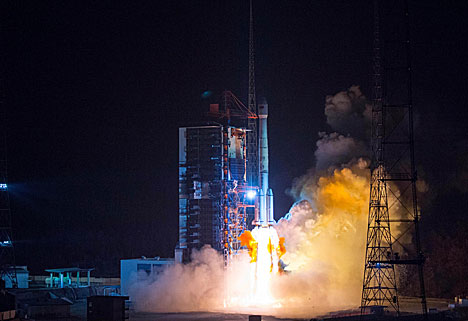Opinions & Interviews
Belintersat-1 to open doors to global satellite services market for Belarus
 MINSK, 16 January (BelTA) – The launch of the Belintersat-1 satellite will allow Belarus enter the world market of satellite-based services, become a member of the international group of professionals in the sector, establish promising partner relations with the key market players, BelTA learnt from the press service of the State Military Industrial Committee.
MINSK, 16 January (BelTA) – The launch of the Belintersat-1 satellite will allow Belarus enter the world market of satellite-based services, become a member of the international group of professionals in the sector, establish promising partner relations with the key market players, BelTA learnt from the press service of the State Military Industrial Committee.
A Long March 3B/G2, China’s most powerful active rocket, with Belarus’ telecom satellite Belintersat-1 on board successfully lifted off from the Xichang launch centre in Sichuan province at 19:57 (Minsk time) on 15 January 2016.
The launch of the satellite to a geosynchronous orbit position of 51.5° will make a successful completion of another stage of the Belintersat project.
It will provide a range of telecommunication services during its expected 15-year lifetime, including satellite TV, radio broadcasting and broadband internet access. It is designed to cover Europe, Africa and Asia in Ku- and C-bands.
The satellite is based on China’s DFH-4 platform. Its main components were supplied by Europe’s leading producers. “All control systems have a high level of reservation and reliability,” said the State Military Industrial Committee. The launch of the satellite and its first-year orbit life are insured by the world’s leading insurance companies.
According to the State Military Industrial Committee, the ground infrastructure of the National Satellite Communication and Broadcasting System of Belarus comprises its ground satellite control system and a teleport. The ground satellite control system was ready from operation in late 2015. The teleport will be put into service in March 2016.
China will control the satellite through the end of January 2016. Then the satellite will be monitored by a joint group of Belarusian and Chinese specialists from the Belarusian ground satellite control system. Belarusian specialists completed their nine-month training course and China’s on-the-job training in July 2015.
The National Satellite Communication and Broadcasting System of Belarus will be fully ready for operation in April 2016. Starting from April the satellite will be put into commercial operation and will be fully controlled by the Belarusian side.
“The development of the National Satellite Communication and Broadcasting System of Belarus is another stage in improving telecommunications necessary for the country’s innovative development,” the committee stressed. The decision to implement the project was adopted by the head of state in 2011. The tender was won by China Great Wall Industry Corporation which is China’s biggest state-run company providing commercial launches and delivery of satellites and developing international cooperation in space technology.
In December 2012 Belarus’ government and the Exim Bank of China signed an agreement on a preferential consumer loan to finance the project. The official start to the Belarusian-Chinese investment project was given in Beijing in late January 2013. In the same year the parties launched the development of the National Satellite Communication and Broadcasting System of Belarus: the production of a geostationary satellite in China and the construction of the ground satellite control system in Minsk Oblast.
“It is the country’s export-oriented project with the aim to develop a geostationary satellite and provide a wide range of telecommunications services to public and corporate clients as well as operators of the CIS and non-CIS countries,” the committee said. The implementation of the project will help strengthen the country’s positions in the global information society, secure its information independence and information presence on the Eastern hemisphere. It will also allow implementing new technology, improve the country’s export potential.
The Belintersat project will provide a series of services for Belarusian commercial and state-run organizations. These are internet access and mobile satellite communications, solutions for mobile operations, corporate data communication networks, live transmission and TV broadcasting.
“The Belintersat team also works actively to establish cooperation with potential consumers of the satellite services. Special attention is focused on foreign partners and consumers,” the State Military Industrial Committee said.







 print version
print version make home page
make home page add to bookmarks
add to bookmarks

